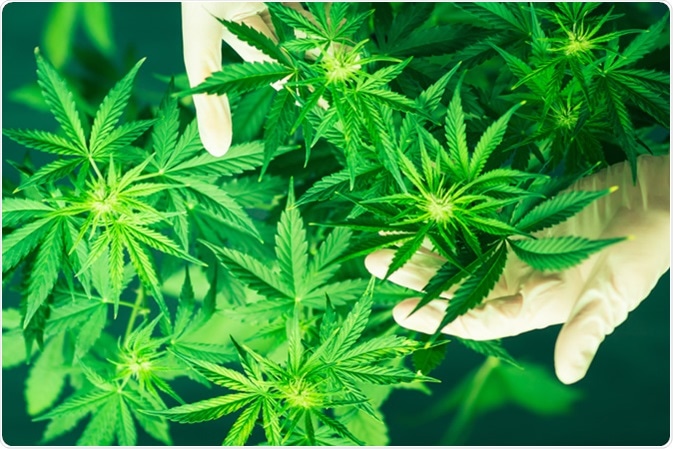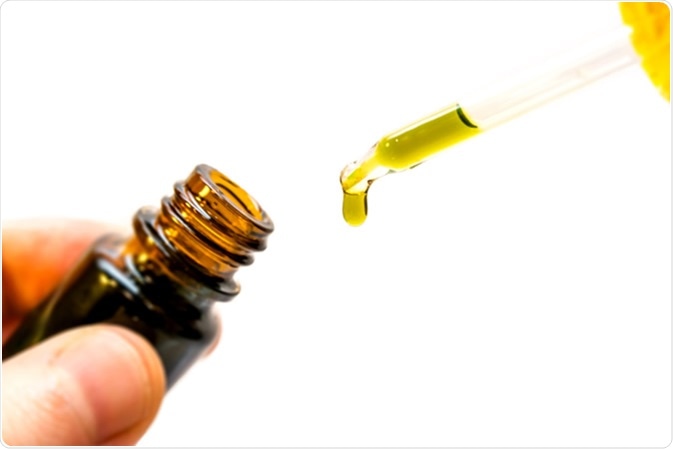Skip to:
Substance use disorders such as drug addiction are conditions with a relapse risk increased by drug cues, vulnerability to stress, anxiety and impaired impulse control. As the number of people who suffer from drug addiction in the United States continues to rise there is an increasing need for new and effective therapeutic protocols and treatments.
What is CBD?
There is a growing debate over the statutory medical use of marijuana and cannabinoids. Whilst there have been documented successful uses of cannabis and its derivatives in a medical context, concerns remain about its short-term and long-term side-effects including potential drug dependency and the development of psychotic illness.
Cannabidiol (CBD) is a constituents of cannabis and in its purest form is non-psychoactive and non-addictive making it an attractive candidate for use as therapeutic drugs.

Cannabis. Image Credit: Lifestyle Discover / Shutterstock
Previous research has indicated that CBD may be effective when used to reduce seizures in people with epilepsy and has both anti-inflammatory and analgesic effects. Now researchers have focused their efforts into investigating the potential of CBD to control cravings associated with substance abuse.

CBD Oil. Image Credit: Creativan / Shutterstock
How Does CBD Work?
Despite extensive research in this area, the exact mechanism of CBD is not yet fully understood. CBD binds to receptors in the brain and it is thought it inhibits the endocannabinoid system which has receptors throughout the brain and the body. The endocannabinoid system has multiple functions including the regulation of mood, appetite, memory and pain sensation. CBD binds to serotonin and adenosine receptors which influence pain perception and inflammation. Unlike, marijuana, CBD does not attach to CB1 and CB2 receptors in the brain which in simple terms means that although CBD acts like a drug it does not cause the same “high” state associated with drug use.
Evidence for the Potential Role in Addiction Treatment
Recently, CBD has received a lot of attention due to its potential to treat drug and alcohol abuse. Literature focuses on the pharmacotherapeutic potential of CBD in terms of its relevance in prevention of relapse in drug use. It is thought CBD is effective in targeting risk states of drug use relapse by reducing anxiety and stress related to drug cues and mediating anti-depressant activity. In addition to that, CBD has an impact on the brain circuitry that is responsible for drug craving and seeking behaviours triggered by drug-related context and stress.
Taking into consideration the neuropharmacological and behavioural effects of CBD and its impact on the neurocircuitry controlling addiction, the implications of CBD for the development of new treatments of drug addiction has attracted the interest in the research community investigating therapeutic solutions for drug addiction and relapse.
Pre-clinical studies investigating CBD as a treatment for cocaine self-administration in animals have been contradictory. One study in rats showed no reduction in cocaine self-administration after treatment with CBD while another in mice showed a reduction in cocaine use. Gonzales-Cuevas and colleagues investigated the potential of CBD in animal models of drug craving, impulsivity and anxiety. In the study, rats with alcohol and cocaine self-administration history received CBD for seven day at a 24 hour interval basis. The results from this study document two dimensions of the potential of CBD. First, CBD had an effect on relapse conditions such as sensitivity to drug context and stress, impaired impulse control and anxiety. This points to CBD’s potential ability to refine vulnerability states that promote relapse in rats. Second, CBD’s effects were long-lasting in the animals regardless of the short period of the treatment. This discrepancies between these animal studies, potentially due to differences in methodology emphasises the need for further investigation into this controversial area of research.
A recent study published in the American Journal of Psychiatry, led by Yasmin Hurd, further demonstrates the ability of CBD to reduce cravings in people with heroin drug addiction. The study involved 42 women and men with history of heroin abuse attempting to abstain from relapse. As part of the experiment participants were shown two types of videos: neutral videos showing nature scenes and videos showing drug-related cues aiming to trigger drug cravings. The participants were divided into three groups: people who took 400mg of CBD, people who took 800mg of CBD and a placebo group. The interventions were taken for three consecutive days. The experiment was double-blinded, meaning that neither the researchers, nor the participants were aware of which conditions they were assigned to during the experiment.
Participants experienced higher cravings after seeing the heroin related videos as compared to the neutral videos as expected. However, those participants who took CBD as part of the treatment reported less drug cravings that people in the placebo group after exposure to drug-related cues. Results also demonstrate reduction in anxiety as well as reduction in heart rate and cortisol which is the “stress hormone”. The effects on the intervention were visible as soon as one hour after administration of CBD and were still visible up to one week after the intervention.
Current State of Drug Addiction Treatment and Future Directions
The available medication for opioid addiction unfortunately has only temporary effectiveness because these substances have addictive properties themselves. CBD may provide a potentially alternative way of targeting drug addiction without causing further addiction.
However, there is still limited evidence to support the use of CBD to treat drug addiction. The pre-clinical trials carried out are on animals and there are few human studies. To date, no clinical trials on humans have been completed and it will also be important to evaluate the long-term effect of CBD use beyond one week of intervention.
Although a promising candidate for drug addiction treatment, at the current time further research must be carried out before CBD can be safely used to treat drug addiction.
References
Further Reading
Last Updated: Aug 22, 2019